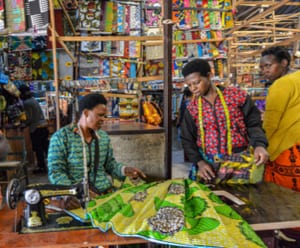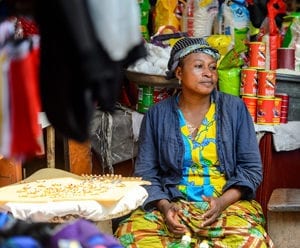
Five Forces Shaping The Future Of Entrepreneurship In Africa

All across Africa, bright young people work every day to create a better, greener, more prosperous future. Demographically, the continent is younger than any other – and the Ouagadougou Partnership estimates that Africa will account for more than half of the world’s population growth between today and 2050.
These young people are eager to apply their energy, creativity and innovation, so naturally, entrepreneurship is also on the rise. According to comprehensive research by the Tony Elumelu Foundation (TEF) and Stanford University, Africa currently boasts the highest percentage of entrepreneurs among working-age adults anywhere in the world.
To have the best chance at succeeding in business and making a real change in their regions – especially in the wake of the Covid crisis – up-and-coming entrepreneurs will need to contend with a range of complex considerations. Here are five of the challenges and opportunities that lie ahead for Africa’s next generation of entrepreneurs.
Thinking beyond borders
Africa’s borders have long been a limiting factor for development. The borders, many of which were imposed by European and US colonial powers in the 1884 Berlin Conference, crisscross the continent in completely arbitrary ways. These borders have changed very little since, and they continue to divide local cultures and ethnic and linguistic groups, presenting an obstacle to collaboration and commerce.
While borders have limited the ability of African people to determine their futures, the recent African Continental Free Trade Area (AfCFTA) promises a better future. Companies of all sizes, from small businesses to multinationals, can now trade without limitations across Africa. The UN Economic Commission for Africa expects the agreement to boost intra-African trade by 52 percent by 2022.
Cutting the red tape and putting an end to tariffs puts the next generation of entrepreneurs in an excellent position to transform the continent. For the best chance at success, I recommend that businesses think outside of the box and use the newfound freedom that the AfCFTA provides to find new, borderless opportunities.
Out with the old, in with the digital
Since the year 2000, the number of internet users on the continent has grown by fifty times, according to Brookings. The same data suggests that mobile technologies are responsible for 1.7 million jobs and US$144 billion of the continent’s economy – around 8.5 percent of its GDP.
At DHL, we are working toward systematic digitalisation as part of our Strategy 2025 to provide businesses of all types with the best possible logistics experience. DHL’s Saloodo! is already the first digital marketplace to offer road freight connection between the Arabian Peninsula and North Africa, leveraging technology to enable greater transparency at every step of the process.
We have also recently expanded our digital platform, myDHLi, which provides customers with full visibility and control over ocean and air freight. The digital platform makes it simple to get a quote, book and track a shipment, and even review documents and analytics, and it has driven a 56 percent increase in online bookings.
The continent’s burgeoning tech industry has also responded admirably to the Covid crisis – the World Health Organisation reported that 12.8 percent of all new or modified technology developed to respond to COVID-19 is African.
Even non-tech businesses benefit from making use of modern technology. Digitalisation streamlines, simplifies, and integrates businesses in ways that weren’t possible before. For example, South Africa-based inclusive doll manufacturer Malaville Toys has used social media and e-commerce to reach an international audience of collectors.
However, affordable Internet access and reliable power are still major issues. Together, entrepreneurs, businesses and governments will all have a role to play in ensuring that everybody on the continent has access to tech. In turn, this will further widen the market for entrepreneurs and stimulate the economy.
Logistics: making the world smaller
The world is more connected than ever, and tomorrow’s entrepreneurs need to understand that everything they do has a global context. At DHL, we’re constantly reminding ourselves to “think global, act local.” Being aware of the bigger picture can reveal otherwise invisible opportunities, such as selling into more mature markets overseas.
For example, our GoTrade program takes businesses from selling locally to selling to customers around the globe using the power of our logistics network. Now, small- and medium-sized businesses in African countries which were previously behind on globalisation can access countless new opportunities in developed markets.
Logistics is the engine that drives our global world, building ties between regions and establishing cross-border trade pathways that create new opportunities and boost the economy. Some of the next generations of entrepreneurs will join me in the logistics industry, and I recommend linking up with businesses such as DHL, which have extensive market experience.
Currently, there are a significant number of entrepreneurs in Ethiopia joining the logistics industry. However, the country’s rapidly developing sector is still working to adopt global standards – a small hurdle, but one which could affect the speed of its growth. At DHL, we work with the World Trade Organisation and other trade alliances to give young logistics entrepreneurs a head-start on cross-border compliance and other potential obstacles.
Funding for growing enterprises
Many businesses seek funding as a way to grow more quickly or cover costs during a critical period. Last year’s African Tech Startups Funding Report showed that there was a significant increase in the amount of funding that businesses on the continent – especially in Kenya, Egypt, Nigeria and South Africa – were able to attract from investors.
In addition to traditional means of funding, such as bank loans, more modern forms are also becoming popular. Venture capital, for example, is gaining traction in Africa with estimates suggesting that the total investment in African businesses will exceed US$2.25 billion this year. Other forms of funding that are on the rise include microfinance and crowdfunding from digital providers, opening up a range of options for growing businesses.
Preparing for the future
We don’t know what’s coming next, as Covid has reminded us, but as we reckon with the effects of the pandemic, I remain optimistic. Africa’s future is bright. The continent is like a coiled spring, full of potential and ready to leap into action, and I can’t wait to see how tomorrow’s entrepreneurs shape the future.
The keys in the near future will be adopting sustainable business models, making the most of technology, maintaining a global mindset, and joining hands with experienced partners. There are lots still to do, like anywhere else, but the determination and creativity of Africa’s young people is reason alone to be optimistic about the years ahead.
This article is written by Amadou Diallo, Chief Executive Officer of DHL Global Forwarding Middle East and Africa. It was originally published here and was republished with permission.
ALSO WORTH READING













 English
English